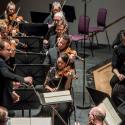 Leonardo Leo: Sacred Works Ensemble &cetera/Ulrike Hofbauer (soprano and direction) (Deutsche Harmonia Mundi)
Leonardo Leo: Sacred Works Ensemble &cetera/Ulrike Hofbauer (soprano and direction) (Deutsche Harmonia Mundi)
Leonardo Leo lived and worked in Naples in the early 18th century, effectively running the city’s musical life alongside Francesco Durante after the death of Alessandro Scarlatti in 1725. He didn’t enjoy a long and successful career, dying relatively young after a botched skin operation. His music, at least on the basis of this anthology, deserves to be much better known. Much of why it sounds so attractive here is down to the quality of these performances. Soprano Ulrike Hofbauer has one of the loveliest voices I’ve heard on disc, and she also secures crisp, lively support from her own Ensemble &cetera. Take the second section of Leo’s Salvina Regina in F; Hofbauer’s intensely musical, gloriously lyrical delivery turning the piece into a sensuous delight. Immaculate instrumental playing adds to the fun.
A C minor setting of the same text is predictably darker and more introspective, as is Leo’s cantata Il figliuol prodigo. We get the ravishing Lezione del Giovedi Santo, and &cetera's Markus Hünninger gives us a pair of feisty harpsichord toccatas. Hofbauer also directs a more musically extrovert concerto grosso by Durante. It’s immaculately written and smartly played, though rarely as harmonically interesting as the works by Leo. Still, this is glorious stuff, and one of the most appealing Baroque vocal discs of 2016. Good cover photo too.
 Martinů: Ariane, Double Concerto (Supraphon) Essener Philharmoniker/Tomáš Netopil, with Simona Šaturová (soprano) and Zoltán Nagy (baritone)
Martinů: Ariane, Double Concerto (Supraphon) Essener Philharmoniker/Tomáš Netopil, with Simona Šaturová (soprano) and Zoltán Nagy (baritone)
I’ll start with the coupling, as it’s a corker. Martinů’s Double Concerto is a bona fide masterpiece, a work every bit as good as Bartók’s not dissimilar Music for Strings, Percussion and Celeste. Also commissioned by the Swiss conductor Paul Sacher, the work was first heard in 1940. Martinů later described it as “a piece lived through under difficult circumstances…. it possesses neither despair nor gloom… but an unshakeable faith in the future…” Scored for double string orchestra, timpani and piano, it’s fiendishly difficult to perform well. Tomáš Netopils’s live version is outstanding. There’s a wonderful moment about five minutes in, just before the first movement recapitulation: percussive piano chords jabbing away under feverish, chromatic string writing, the tension building as the volume increases. After an abrupt collapse, the nervy first theme abruptly reappears. The Essen Philharmoniker’s strings are superb, Netopil turning the screws as the music grows louder and more frenzied. The concerto’s close is devastating: the slow movement’s anguished theme rearing up before a subdued, exhausted collapse, Martinů’s customary positivity strikingly absent.
More readily accessible is the late one-act opera Ariane, a disarmingly entertaining French language adaptation of the Theseus legend. Martinů’s transparent, crystalline score is consistently appealing, opening with a charming tinkly prologue. Dramatic events are handled in deliciously offbeat fashion. One character’s grisly end is comically underplayed. But just as you’re about to dismiss Ariane as erudite fluff, there’s a startlingly beautiful aria from Simona Šaturová’s Ariane, the opera then ending peacefully with soft tuned percussion. Absolutely irresistible; I’m kicking myself for having missed a recent London staging. Full texts and translations are provided, and Netopil’s supporting cast are all strong. You can never own too many Martinů recordings. Add this one to your collection.
 Schubert: Piano Trios op.99 and op.100 Andreas Staier (fortepiano), Daniel Sepec (violin) and Roel Dieltiens (cello) (Harmonia Mundi)
Schubert: Piano Trios op.99 and op.100 Andreas Staier (fortepiano), Daniel Sepec (violin) and Roel Dieltiens (cello) (Harmonia Mundi)
Schubert’s two piano trios are on a vast, symphonic scale but ooze a very chamber-like conviviality. They receive superb period-instrument performances on this pair of discs. Sensible listeners will be grinning at Daniel Sepec’s unfussy delivery of the B flat trio’s opening theme, and purring with pleasure when Andreas Staier repeats it a minute or so later. It’s phrased with such unforced care, Roel Dieltiens’s plucked bass line just loud enough. He catches the second subject’s bittersweet mood to perfection. The balance throughout is impeccable, the fortepiano never overpowering the solo strings. The rest is as good: a soulful slow movement followed by a scherzo and finale which breeze along, Staier’s lightness of touch delightful.
Better known is Schubert’s E flat trio; equally affable despite several surprising moments of introspection. This composer’s happiness often seems balanced on a knife edge, and Staier’s team get the slow movement’s pacing exactly right, the whole thing quietly heart-stopping. The uninitiated should then watch Kubrick’s Barry Lyndon, the seduction scene of which makes stunning use of this music (though the director’s obsessive desire for historical authenticity would have been better served by using a performance as good as this one). Schubert’s reprise of the funeral march theme in the finale is a glorious musical moment, handsomely done by these players. Genuinely outstanding, and there’s a nice bonus in the form of Schubert’s posthumously published Notturno.














Add comment